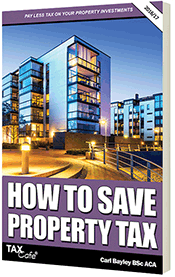Landlord Tax Planning Guide from Taxcafe
How Landlords Can Pay Less Tax
As a landlord you face paying several different types of tax at different times: stamp duty land tax when you buy properties, income tax on your rental profits, capital gains tax (CGT) when you sell your properties and inheritance tax if you leave them to your loved ones.
The latest information can be found in our:
Landlord Tax Planning Guides
Income tax could swallow up to 45% of your rental profits, CGT could take up to 28% of your capital gains and inheritance tax could confiscate up to 40% of your property portfolio. The good news, however, is that all of these taxes can be reduced to some extent with judicious tax planning.
Income Tax Planning for Landlords
Rental profits are subject to income tax but, unlike other businesses, your profits are not subject to national insurance. So that's one bit of good news.
If you don't have any other taxable income then some or all of your rental profit will be tax free, being covered by your income tax personal allowance.
If you do have income from other sources but are a basic-rate taxpayer then some or all of your rental profits will be taxed at just 20%.
However, most landlords are part-timers and hold down a job or have another business which produces taxable income. Those that are higher-rate taxpayers will pay 40% tax on their rental profits.
Earning rental profits may also result in other unforeseen tax consequences. For example, if it pushes your total taxable income above £50,000 then your family may have its child benefit taken away. If it pushes your taxable income over £100,000 then your personal allowance will be withdrawn.
Landlords with taxable income of more than £150,000 will pay 45% tax on their rental profits.
Although rental profits can be taxed quite heavily there's lots of tax planning you can do to mitigate the pain. For over 10 years Taxcafe has been publishing a tax advice guide for landlords called How to Save Property Tax. It contains dozens of tried and tested income tax planning ideas for landlords.
The first thing to note is that you only pay income tax on your rental profits, not your overall rental income. Your profits are found by subtracting your expenses from your total rents. The more expenses you claim, the less tax you will pay.
There are lots of expenses that many landlords overlook altogether or do not claim enough. Examples include home office expenses and use of your car. Many landlords also do not fully understand the rules for deducting mortgage interest which can be more generous than you think.
Another area of confusion for many landlords is the distinction between repairs and improvements. Repairs are a tax deductible expense when you calculate your rental profits, improvements are not (they are a deductible expense for capital gains tax purposes). Many expenses that are often viewed as "improvements", e.g. new kitchens and bathrooms, can often be claimed as repairs, producing significant income tax savings.
Our tax guide lays out all the important expenses you can claim and explains the rules in plain English. It also covers more advanced landlord tax planning, for example deciding who should own the properties: you, your spouse or perhaps your children.
A more drastic solution is to set up your own company to hold your properties. by doing this you can avoid 40% income tax and pay just 20% corporation tax. Of course it's not quite as simple as this and there are lots of other tax planning issues to consider. These are all fully covered in another important guide we publish called Using a Property Company to Save Tax.
Capital Gains Tax Planning for Landlords
Capital gains tax is generally payable when you sell rental properties. It may also be payable if you transfer a property to someone else, eg another family member (although spouses are generally exempt).
Tax is generally payable at 28% on your "profit" - the difference between the price you paid for the property and the price you sold it for.
You can also deduct your buying and selling costs from your profit, e.g. stamp duty land tax, solicitors fees, estate agents fees etc.
Not all of your profits are taxable - the first £11,000 or so is tax free, being covered by your annual CGT exemption. If both you and your spouse own the property then the first £22,000 or so is tax free.
There are lots of things you can do to mitigate capital gain tax and these are all covered in our guide How to Save Property Tax.
Just one example: not all capital gains are taxed at 28%. This tax rate is only payable if you are a higher-rate taxpayer. Taxpayers with less income only pay 18% tax. So if you can transfer properties to your spouse who is a basic-rate taxpayer or sell properties in years when your income is very low (e.g. when you retire) you may be able to pay tax at just 18%.
Capital gains tax is also not payable when you sell your home. It is possible to reduce capital gains tax by making a main residence election for a second home you own. it is also possible to reduce capital gains tax by moving into a rental property and making it your home for a period.
There are lots and lots of other tried and tested capital gains tax planning strategies for landlords and these are all covererd in our tax guide.






